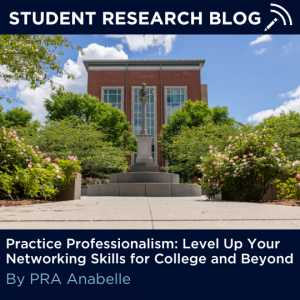By Anabelle Bergstrom, Peer Research Ambassador
 College offers so many opportunities to study topics that you find interesting or that will help you navigate your future career. Learning logical reasoning skills through mathematics, understanding the food chain, and discussing historical sources for research are all great skills that can take you far. As I have migrated through the academic sphere and into professional workplace environments, I have learned how important another skill that is not talked about nearly enough: professionalism. Being professional goes beyond what you wear to classes or work every day. Learning the many skills that are part of “being professional” can open new doors, allow you to meet new people, and could even land you a job someday.
College offers so many opportunities to study topics that you find interesting or that will help you navigate your future career. Learning logical reasoning skills through mathematics, understanding the food chain, and discussing historical sources for research are all great skills that can take you far. As I have migrated through the academic sphere and into professional workplace environments, I have learned how important another skill that is not talked about nearly enough: professionalism. Being professional goes beyond what you wear to classes or work every day. Learning the many skills that are part of “being professional” can open new doors, allow you to meet new people, and could even land you a job someday.
One of the many skills that is often associated with achieving professionalism is the way one dresses when one shows up for a meeting or for work. Of course, dressing appropriately for the event you are attending is important. However, being professional is more than external “what meets the eye” characteristics. You could show up to an interview looking the part, but that will not matter if you are unable to introduce yourself in a clear and confident way. The way you address people, eye contact, and being punctual are just a few of the ways you can level up how you portray yourself outwardly. These skills are incredibly important as you begin or continue to network with those in your field.
Learning to write professional emails to your colleagues and superiors is key. Starting emails with a salutation (“Dear Professor X, Good Afternoon Mr. X, etc.) is the first step you can take. Maintaining professional, mature, courteous, and respectful language throughout your emails is the second thing you can do to show professors and bosses that you take your role seriously. Ending your email with a “thank you” is always my go-to. You can never go wrong with saying thank you. I encourage you to find your own style to professional email etiquette that maintains your individual personality while still showing respect to those you are emailing.
Another tip besides emails is in the way you approach professors and those you want to (or currently) work with. I love to shake people’s hand when I meet them or have not seen them in a while (which was very difficult for me to put aside during the pandemic). I think it adds another layer of confidence and personality to my interactions with others. This is not everyone’s preferred method of introducing themselves, and that is ok! The biggest piece of advice I can give you is 1) take a deep breath and 2) maintain eye contact. Meeting new people or being socially active is difficult for many. If you are confident and respectful, you will find the rest will come together with practice.
A third group of skills that is important as you make your way into your desired field is being punctual and maintaining contact with important individuals. If you make an appointment with someone, show up on time. Do not cancel unless an emergency has come up. Make time for your commitments and dedicate yourself to maintaining meaningful connections you will inevitably make through networking. Being on time for your appointments and meetings shows that you take the relationship you have with the other person seriously. This skill is important in every single facet of life, so learning it sooner than later is key. Remember that people in academia and beyond talk, so not showing up for meetings will have farther-reaching consequences than you might initially realize.
The skills I mentioned are only a few of the many ways you can work on being professional to those around you. They are not skills you will learn in a class. The only way to get more comfortable with talking to other people effectively is by practicing. Through practice you will learn what allows you to put your best self out there and what may not work well. Learning these skills now will set you up for an easier transition into the workforce and will undoubtedly contribute to your success.
Anabelle is a senior double majoring in Political Science and Philosophy. Click here to learn more about Anabelle.